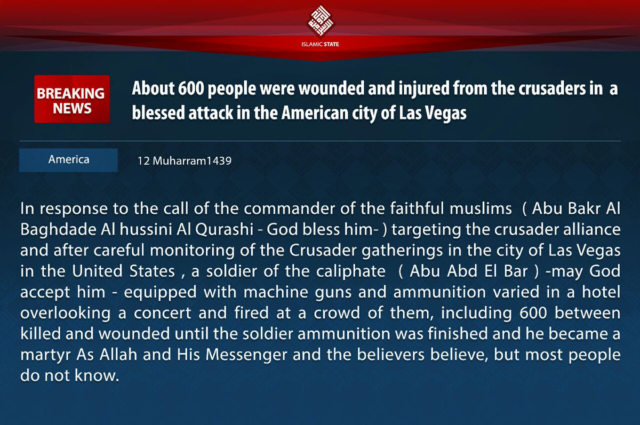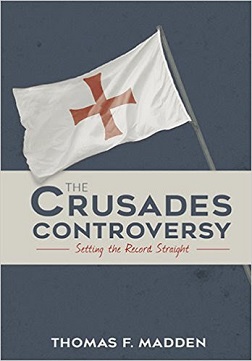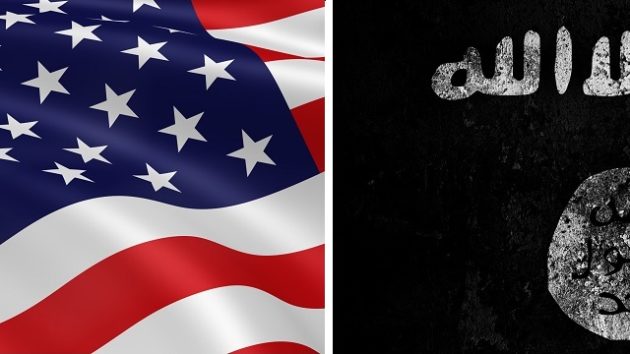ISIS labels those killed and wounded in Las Vegas ‘Crusaders’ — Why?
The Islamic State of Iraq and Syria (ISIS) issued the following statement about the massacre in Las Vegas:

The ISIS statement on the massacre in Las Vegas refers to those wounded and injured as “crusaders.” ISIS goes on to call those attending the outdoor concert as members of “the crusader alliance” and the event as a “Crusader gathering.”
QUESTION: Why? ANSWER: It’s a big lie!
 Thomas F. Madden, professor of Medieval History and Renaissance Studies as Saint Louis University, is a recognized expert on the Crusades. Professor Madden in his book “The Crusades Controversy: Setting the Record Straight” notes, “Prior to September 11, 2001, the world was a different place. Then, the Crusades were a faraway concept, an odd series of events in a distant and murky medieval past. Wars of religion seemed largely irrelevant to citizens of a modern secular civilization. That has changed.”
Thomas F. Madden, professor of Medieval History and Renaissance Studies as Saint Louis University, is a recognized expert on the Crusades. Professor Madden in his book “The Crusades Controversy: Setting the Record Straight” notes, “Prior to September 11, 2001, the world was a different place. Then, the Crusades were a faraway concept, an odd series of events in a distant and murky medieval past. Wars of religion seemed largely irrelevant to citizens of a modern secular civilization. That has changed.”
Professor Madden’s expertise in the Crusades brought him into the lime light and lead him to write how we got to this point in time. Professor Madden wrote that Osama Bin Laden, “never failed to describe the American war against terrorism as a new Crusade against Islam, and the Americans themselves as crusaders…The Islamic State of Iraq and Syria (ISIS), for example, routinely refers to the United States, Israel, and European nations as ‘crusader states.’ Ironically this perspective is not an uncommon view in the Middle East.”
On October 1, 2017, in Las Vegas, Nevada, nearly 600 innocent people paid the price in these ongoing “wars of religion” against the “crusader nations.”
Professor Madden notes that the Crusades were defensive acts to stop the spread of Islam. He writes, “Pope Urban II called the knights of Christendom to push back the conquests of Islam at the Council of Clermont in 1095. The response was tremendous. Many thousands of warriors took the vow of the cross and prepared for war.” Why did they do it? For two reasons:
- The first was to redeem [free from oppression] the Christians of the East.
- The second goal was the liberation of Jerusalem and the other places made holy by the life of Christ.
Professor Madden writes:
The word crusade is modern. Medieval crusaders saw themselves as pilgrims to the Holy Sepulcher.
[ … ]
The re-conquest of Jerusalem, therefore, was understood by Christians as an act of restoration and an open declaration of one’s love of God.
[ … ]
In Medieval Europe, Crusades to the East were universally seen as acts of tremendous good. And how could they not? A crusader was one who, at great expense and personal peril, sought to rescue the downtrodden, defend the defenseless, and restore to Christendom what had been violently taken away. A Crusade indulgence, then, was a formal recognition of the penitential component of these actions. Crusaders were sinners. They undertook the Crusade not only to defend their world, but to atone for their sins. By the nature of their profession, warriors put their souls at risk. The Crusade was a means for them to save their souls. And that was no small thing. I the medieval world, where death was always near at hand, the salvation of one’s soul meant everything. It was a matter of constant concern. [Emphasis added]
Of the eight Crusade expeditions that occurred between 1096 and 1291, only the First Crusade was a success.
“The last Christian outpost in the Holy Land fell in 1291. In subsequent centuries the dramatic growth of Muslim power, particularly under the Ottoman Empire, spelled only further defeats for the West. By the fourteenth century the Crusades were no longer wars to turn back Muslim conquests in faraway lands, but desperate and largely unsuccessful attempts to defend Europe itself against Muslim invasion. By the sixteenth century the Ottoman Turks had conquered all of the Middle East, North Africa, and southeastern Europe, including areas today that are Greece, Bulgaria, Albania, Hungary, and others. Sultan Suleiman the Magnificent came within a hair’s breadth of conquering Vienna, which would have left all of Germany at his mercy. Vienna was saved by freak rain storms, not the Crusades,” notes Professor Madden.
For the Arab world the Crusades were of no consequence and long forgotten.
In Chapter Four Professor Madden writes, “The first Arabic history of the Crusades was not written until 1899…Traditionally, Muslims took very little interest in people or events outside the dar al-Islam [house of Islam]…The Crusades were, in any case, unsuccessful and thus irrelevant…In the grand sweep of Islamic history the Crusades simply did not matter.”
The big lie resurrected by former President Bill Clinton after 9/11.
Professor Madden reports:
[I]n a speech delivered at Georgetown University a few weeks after 9/11, former President Bill Clinton stated:
“Those of us who come from various European lineages are not blameless. Indeed, in the First Crusade, when the Christian soldiers took Jerusalem, they first burned a synagogue with three hundred Jews in it, and proceeded to kill every woman and child who was Muslim on the Temple Mount. The contemporaneous descriptions of the event describe soldiers walking on the Temple Mount, a holy place to Christians, with blood running up to their knees. I can tell you that that story is still being told today in the Middle East, and we are still paying for it.”
Clinton is correct that the story is still told, but it is neither accurate nor is it a long-held memory of a traumatic event. Indeed, the simple and startling fact is that the Crusades were virtually unknown in the Muslim world even a century ago. The term for the Crusades, harb al-salib, was only introduced into the Arab language in the mid-nineteenth century.
Ironically, “The ‘long memory’ of the Crusades in the Muslim world is, in fact, a constructed memory-one in which the memory is much younger than the event itself…[W]hen European colonial powers took control of the Middle East in the wake of the collapse of the Ottoman Empire, they brought with them a concept of the Crusades and an understanding of their own actions within that medieval context. In books and colonial schools Europeans taught the Muslim world about the Crusades. They were vividly described as heroic enterprises whose aim, like that of the Europeans, was to bring civilization to the Middle East.”
So it was the colonial European West who taught Muslims about the Crusades. And they are still paying for it today.
RELATED ARTICLE: PBS Broadcasts Crusade Myths & Falsehoods



Excellent info !